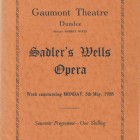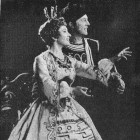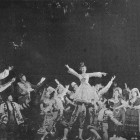Lustige Witwe 1958Sadler's Wells Opera
Read more about the opera Merry Widow
Charles Hickman's production of The Merry Widow was a real money-spinner for the company, with several national tours and a long West End run at the London Coliseum (which planted the seed of the idea that brought about the company's move to that theatre a decade later).
Highlights of the production were recorded, though by that time, Alexander Gibson had moved north to conduct the SNO, and the recording was conducted by William Reid.
This tour included a week in each of the four Scottish cities, with the same four operas - Bohème, Traviata, Figaro and Merry Widow.
Thomas Round developed throat problems during opening night in Dundee, and had to be replaced by John Larsen. He may have missed other performances.
Dundee Press Previews
Dundee Courier & Advertiser: Tuesday, April 15 1958
“The Widow” draws the crowds
'Dundee has gone for The Merry Widow in a big way. With three weeks to go until Sadler's Wells Opera opens with the Lehar operetta at the Gaumont Theatre, practically every seat has been booked for its performances on the Monday and Wednesday evenings. But there is still a good chance of seats for the Saturday matinee of The Widow.
'Mr R Wood, Gaumont manager, said last night - “We have not been able to accommodate hundreds of seats for The Merry Widow.” That's mostly due to the heavy postal bookings. “Some people seem to be still under the impression that postal bookings are only for people living outside Dundee, but that's not the case. Block bookings from offices, shops, etc have been heavy, too. In some cases we've had to scatter parties instead of having all their seats together.”
'The cast for The Merry Widow will be much the same as in the recent London performances and TV and radio broadcasts. June Bronhill and Thomas Round will be the stars of all three Gaumont shows. Principal Sadler's Wells conductor Alexander Gibson will be in charge on the Monday night; William Reid conducts on Wednesday night and Saturday afternoon.
'Alexander Gibson will conduct The Marriage of Figaro on the Tuesday night, and Michael Moores on the Thursday night. There will be five changes among the principals for the second performance of Figaro. Victoria Elliott, William McAlpine, and Peter Glossop will appear in La Traviata (Friday), with Alexander Gibson conducting. On the Saturday evening, Patricia Howard, Robert Thomas and Elizabeth Fretwell will have the leads in La Boheme (conductor Alexander Gibson).'
Dundee Courier & Advertiser: Wednesday, April 23 1958
“Merry Widow” is a sell-out
'Every seat has been sold for the Sadler's Wells Opera's three performances of The Merry Widow in Dundee on Monday and Wednesday nights, May 5 & 7, and Saturday matinee, (May10).
'Mr R Wood, manager of the Gaumont Theatre, said yesterday - “I've just sold the last seat for the matinee. I should think it's a record - a stage show completely selling out in Dundee, especially for a matinee.” Seats are plentiful still for the other operas to be presented that week.'
Dundee Courier & Advertiser: Monday, May 5 1958
Sadler's Wells move in
'There was no rest yesterday for technicians and stage hands of Sadler's Wells Opera Company, who start their week's stay in Dundee with The Merry Widow tonight at the Gaumont Theatre. By yesterday afternoon all the scenery had arrived from Edinburgh, where the company appeared last week. No special trains were required for transport of the elaborate props, as “for a change the normal train services fitted in,” said opera manager Mr John Wright.
'The most important people yesterday were the “backroom boys”. Some singers had arrived in Dundee, but Mr Wright said others were staying in Edinburgh until today, as there would be no rehearsals before tonight's Merry Widow. The only rehearsals will be for lighting, etc. The company will tour for II weeks. From Dundee they go to Aberdeen.'
Dundee Press Opinion
Dundee Courier & Advertiser: Tuesday, May 6 1958
Understudy takes over in opera crisis
'The packed audience at Dundee Gaumont Theatre last night for Sadler's Wells Opera's famed sell-out The Merry Widow were just settling down to the developing first act when something very unusual occurred. Thomas Round, principal tenor, had just come on stage looking his usual debonair self as Count Danilo - but when he started to sing everyone realised there was a great deal not right with his voice. In his first song and duet he could scarcely climb above moderately high notes, and even those sounded distinctly 'froggy'. At the count's next entrance, a newcomer appeared in the leading part - an understudy, who, as the show went on, had a big success and quite won the hearts of the audience for his own merits and for stepping into the breach so smoothly.
'But to Mr Round. He had to leave the stage with a sudden throat infection. A doctor was summoned, saw him in his dressing-room, and advised the tenor to rest and see a throat specialist. So he had to go off to bed at his hotel, and will leave for London this morning. Mr John Wright, opera manager, told me: - 'We all felt desperately sorry for Tommy. He has done the part brilliantly all through the run.'
'After the final curtain the whole company were showering congratulations on John Larsen, 29-year-old tenor from North Shields, who took over the part in shorter than short notice. One moment he was on in an obscure small part - the next the focus of all eyes in the company and in the audience. Larsen's singing, dancing and scarcely a slip of the tongue in dialogue, delighted the audience, which like all audiences was ready to appreciate the efforts of the artiste in an unusually tricky situation.
'Larsen deserved the ovation he got at the final curtain, and the extra (genuine) embrace from The Widow herself (June Bronhill). A chorus and small part singer with the Wells for five years, and a school teacher before that, Larsen said after his first big part: - 'The crisis came so suddenly I hadn't time to think or be nervous, I had a splendid team with me.’ He has been understudying to step into the part when Thomas Round leaves soon to join the D'Oyly Carte Company, and will continue as Count Danilo in the other two Dundee performances this week.
'This excitement apart, The Widow from Sadler's Wells proved what was expected, namely a delightful, colourfully-costumed, melodious entertainment. It is, in effect, a high-plane musical comedy, superbly sung by opera singers. At times, especially in the first act, there is too much explaining per dialogue which takes a bit of following. But the magnificent second act, the 'meat' of the show, brings floods of the Lehar operetta's famous melodies. How eagerly appreciative were the audience of tunes like “Vilia”, “the Merry Widow Waltz”, and “Jogging in a One-Horse Gig” - all presented with subtle musical skill and stage effects.
'Five feet and little more, June Bronhill, whose high soprano is delicious, sang and acted with great vivacity as the heiress widow of Pontevedria - whose late husband's 20 million dollars must remain in that Ruritanian domaine's coffers to keep it solvent. She received rapturous applause many times, most of all for her charming sequence with the “Vilia” song.
'At least eight parts were filled by top-ranking principals. There was a gem of a septette about the failings of women, sung with great aplomb by (otherwise) romantic tenors and dignified baritones, which nearly brought down the house. Howell Glynne gave a delightfully humorous study of the harassed ambassador to lead the comedy. The opera ballet joined in with effervescently gay dancing, including a Parisian can-can on acrobatic lines.
'One of the greatest pleasures was the orchestra, who floated up the sweetly appealing Lehar airs with tasteful perfection under Alexander Gibson's conducting.'
Dundee Courier & Advertiser: Tuesday, May 6 1958
Understudy takes over in opera crisis
'The packed audience at Dundee Gaumont Theatre last night for Sadler's Wells Opera's famed sell-out The Merry Widow were just settling down to the developing first act when something very unusual occurred. Thomas Round, principal tenor, had just come on stage looking his usual debonair self as Count Danilo - but when he started to sing everyone realised there was a great deal not right with his voice. In his first song and duet he could scarcely climb above moderately high notes, and even those sounded distinctly 'froggy'. At the count's next entrance, a newcomer appeared in the leading part - an understudy, who, as the show went on, had a big success and quite won the hearts of the audience for his own merits and for stepping into the breach so smoothly.
'But to Mr Round. He had to leave the stage with a sudden throat infection. A doctor was summoned, saw him in his dressing-room, and advised the tenor to rest and see a throat specialist. So he had to go off to bed at his hotel, and will leave for London this morning. Mr John Wright, opera manager, told me: - 'We all felt desperately sorry for Tommy. He has done the part brilliantly all through the run.'
'After the final curtain the whole company were showering congratulations on John Larsen, 29-year-old tenor from North Shields, who took over the part in shorter than short notice. One moment he was on in an obscure small part - the next the focus of all eyes in the company and in the audience. Larsen's singing, dancing and scarcely a slip of the tongue in dialogue, delighted the audience, which like all audiences was ready to appreciate the efforts of the artiste in an unusually tricky situation.
'Larsen deserved the ovation he got at the final curtain, and the extra (genuine) embrace from The Widow herself (June Bronhill). A chorus and small part singer with the Wells for five years, and a school teacher before that, Larsen said after his first big part: - 'The crisis came so suddenly I hadn't time to think or be nervous, I had a splendid team with me.’ He has been understudying to step into the part when Thomas Round leaves soon to join the D'Oyly Carte Company, and will continue as Count Danilo in the other two Dundee performances this week.
'This excitement apart, The Widow from Sadler's Wells proved what was expected, namely a delightful, colourfully-costumed, melodious entertainment. It is, in effect, a high-plane musical comedy, superbly sung by opera singers. At times, especially in the first act, there is too much explaining per dialogue which takes a bit of following. But the magnificent second act, the 'meat' of the show, brings floods of the Lehar operetta's famous melodies. How eagerly appreciative were the audience of tunes like “Vilia”, “the Merry Widow Waltz”, and “Jogging in a One-Horse Gig” - all presented with subtle musical skill and stage effects.
'Five feet and little more, June Bronhill, whose high soprano is delicious, sang and acted with great vivacity as the heiress widow of Pontevedria - whose late husband's 20 million dollars must remain in that Ruritanian domaine's coffers to keep it solvent. She received rapturous applause many times, most of all for her charming sequence with the “Vilia” song.
'At least eight parts were filled by top-ranking principals. There was a gem of a septette about the failings of women, sung with great aplomb by (otherwise) romantic tenors and dignified baritones, which nearly brought down the house. Howell Glynne gave a delightfully humorous study of the harassed ambassador to lead the comedy. The opera ballet joined in with effervescently gay dancing, including a Parisian can-can on acrobatic lines.
'One of the greatest pleasures was the orchestra, who floated up the sweetly appealing Lehar airs with tasteful perfection under Alexander Gibson's conducting.'
This cast is taken from the week in Dundee.
Sadler's Wells Opera in Scotland - 1958
The four operas performed in each city were Mozart (Marriage of Figaro); Verdi (La traviata); Lehár (Merry Widow); Puccini (La bohème).
The tour visited Edinburgh (King's Theatre); Dundee (Gaumont Theatre); Aberdeen (His Majesty's Theatre; and Glasgow (King's Theatre).
The performance schedule was as follows:
Edinburgh, w/c 28 Apr: Mon 28 Merry Widow; Tue 29 Traviata; Wed 30 Marriage of Figaro; Thu 1 May Merry Widow; Fri 2 Marriage of Figaro; Sat 3 m Merry Widow; Sat 3 e Bohème.
Dundee, w/c 5 May: Mon 5; Merry Widow; Tue 6 Marriage of Figaro; Wed 7 Merry Widowe Thu 8 Marriage of Figaro; Fri 9 Traviata; Sat 10 m Merry Widow; Sat 10 e Bohème.
Aberdeen, w/c 12 May: Mon 12; Merry Widow; Tue 13 Marriage of Figaro; Wed 14 Merry Widow; Thu 15 Traviata; Fri 16 Marriage of Figaro; Sat 17 m Merry Widow; Sat 17 e Bohème.
Glasgow, w/c 19 May: Mon 19 Merry Widow; Tue 20 Marriage of Figaro; Wed 21 Merry Widow; Thu 22 Traviata; Fri 23 Marriage of Figaro; Sat 24 m Merry Widow; Sat 24 e Bohème.
Performance Cast
- Baron Mirko Zeta Pontevedrian Ambassador in Paris
- Valencienne Zeta's wife
-
Marjorie Shires (May 14)
- Count Danilo Danilowitsch Secretary to the legation, reserve cavalry lieutenant
-
John Larsen (May 5)
- Hanna Glawari a wealthy young widow
- Camille de Rosillon
-
Rowland Jones (May 14, 21)
- Vicomte Cascada
- Raoul de St Brioche
- Bogdanowitsch Pontevedrian Consul
-
John Larsen (May 5, 21)
Cragg Sinkinson (May 14)
- Sylviane wife of Bogdanowitsch
- Kromow Counsellor to the Pontevedrian legation
- Olga wife of Kromow
- Pritschitsch retired Pontevedrian colonel, Military Attaché
- Praskowia wife of Pritschitsch
- Njegus Chancery Clerk at the Embassy
- Lo-Lo a grisette
- Do-Do a grisette
- Jou-Jou a grisette
- Frou-Frou a grisette
- Clo-Clo a grisette
- Margot a grisette
Production Cast
- Conductor
-
Alexander Gibson (May 5, 12, 19)
William Reid (May 7, 10m, 14, 17m, 21)
- Director
- Designer - Sets
- Designer - Costumes
- Choreography
- Translator
Performance DatesLustige Witwe 1958
King's Theatre, Edinburgh | Edinburgh
28 Apr, 19.30 1 May, 19.30 3 May, 14.30
Gaumont Theatre | Dundee
5 May, 19.30 7 May, 19.30 10 May, 14.30
His Majesty's Theatre, Aberdeen | Aberdeen
12 May, 19.30 14 May, 19.30 17 May, 14.00
King's Theatre, Glasgow | Glasgow
19 May, 19.30 21 May, 19.30 24 May, 14.30


